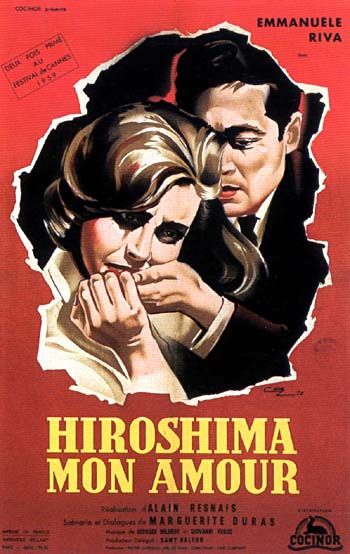
It's been about two days since I saw Alain Resnais's Hiroshima Mon Amour, and in that time Jean-Luc Godard's description of it as "Faulkner plus Stravinsky" has been striking me alternately as apt and, like most attempts to sum up a truly singular work with a simple a+b formula, a little inadequate, as it doesn't really account for the movie's historical resonance (though it's made me listen to more Stravinsky). In one of the interviews on the Criterion disk, Resnais talks about the impossibility of confronting the horror of Hiroshima directly, but in the oft-celebrated opening passage of the movie, he gets awfully close to doing just that.
[the sequence in question continues until around the 5:30 mark]
(As a side note, it's interesting how Resnais's stuff doesn't lose all that much when transposed into the small, pixilated world of YouTube. I've seen this sequence from Hiroshima and the entirety of Last Year at Marienbad in YouTube format, and they don't lose their mesmeric pull, because their visual and editorial construction are so dazzlingly precise. This formal precision also seems to be why, like a lot of Stanley Kubrick's work, they haven't dated at all, barring a few melodramatic flourishes in Hiroshima lead Emmanuelle Riva's performance. Hiroshima's also surprisingly accessible for a film that spends a third of its 90 minutes on its two lovers talking in a restaurant, managing to be both verbose and deeply cinematic.)
After giving us Hiroshima at the outset, Resnais then gives us Mon Amour. But the sheer weight of the former is always pressing down on the latter. I noticed late in the film that the door of the lovers' hotel room has a knob at nearly neck-height. It's as though the city and its past literally dwarfs them*. This is not to suggest that it trivializes or diminishes the characters and their pasts, per se. It manages to deal with and even draw links between personal heartbreak and collective apocalypse without solipsistically equating the two.
I was compelled today to pick up my copy of Pauline Kael's For Keeps to read her review of the film again, which I remembered as being fairly negative, and indeed she is pretty down on it. But like a lot of her takedowns of arthouse faves from those days, it's rather nearsighted, too focused on undercutting its otherwise ecstatic critical reception and poking a finger in the eye of the demographic that was digging it. Part and parcel of being an iconoclast, I guess, but it's a little yawn-inducing, 50 years removed.
*Note that this impression could just be my ignorance of Japanese doorknob height talking. Yet it seems like the kind of thing Resnais would do, and several Googlings of "Japanese doorknobs" returned largely irrelevant and sometimes disturbing results.
No comments:
Post a Comment